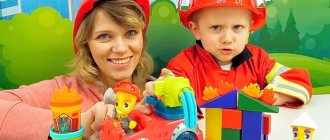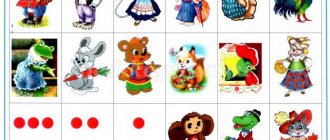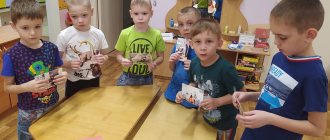Construct based on role-playing game – Polyclinic
The teacher organizes a dialogue to discuss the plot, game actions, game dialogues, and encourages the creation of a game environment.— In order to start the game, you and I need to assign roles. Who do you think works at the Polyclinic? (Therapist, nurse, pharmacist, receptionist)
The teacher listens to the children's answers.
— What kind of work do you think a therapist does? (Therapist treats people)
The teacher listens to the children's answers.
— How does a therapist treat people? (The therapist examines the patient and prescribes treatment)
The teacher listens to the children's answers.
— What should a therapist be like? (Responsible, friendly, polite, smart)
The teacher listens to the children's answers.
— What should we tell the therapist when we come to see him? (Good afternoon, say your complaints, goodbye)
The teacher listens to the children's answers.
—What should the therapist answer? (Good afternoon, take a seat, what are you complaining about? I’m prescribing medicine for you..., get well soon, goodbye)
The teacher listens to the children's answers.
— What do you think a therapist needs to work? (Various instruments)
The teacher listens to the children's answers.
- Children, who wants to be a therapist?
The teacher listens to the children's answers. In case of difficulty, choose according to the counting rhyme.
-I suggest you choose on the table the attributes that the therapist needs, and choose the place where it will be. You can go get settled.
— What kind of work do you think a nurse does? (The nurse writes prescriptions as prescribed by the doctor)
The teacher listens to the children's answers.
— What kind of nurse should a nurse be? (Responsible, polite)
The teacher listens to the children's answers.
— What do you think a nurse needs to work? (Pen and paper to write down the recipe)
The teacher listens to the children's answers.
- Children, who wants to be a nurse?
The teacher listens to the children's answers. In case of difficulty, choose according to the counting rhyme.
-I suggest you choose on the table the attributes that the therapist needs, and choose the place where it will be. You can go get settled.
— What kind of work do you think a pharmacist does? (Sells medicines prescribed by a therapist)
The teacher listens to the children's answers.
— What should a pharmacist be like? (Polite, responsible, friendly, smart)
The teacher listens to the children's answers.
- What do you think we should tell the pharmacist? (Good afternoon, can I please have these medications, thank you, goodbye)
The teacher listens to the children's answers.
- What does the pharmacist say? (Good afternoon, here are your medications, from you... rubles, get well, goodbye)
The teacher listens to the children's answers.
— What do you think is needed for a pharmacist? (Various medicines, cash register, money)
The teacher listens to the children's answers.
- Children, who wants to be a pharmacist?
The teacher listens to the children's answers. In case of difficulty, choose according to the counting rhyme.
-I suggest you choose on the table the attributes that the therapist needs, and choose the place where it will be. You can go get settled.
— What kind of work do you think the receptionist does? (The receptionist makes an appointment with a therapist, gives a coupon, and tells him which office to go to)
The teacher listens to the children's answers.
— What do you think a receptionist should be like? (Polite, responsible, friendly)
The teacher listens to the children's answers.
— How should we contact the receptionist? (Good afternoon, can I make an appointment to see a therapist? Which office should I go to? Where is it located? Thank you, goodbye)
The teacher listens to the children's answers.
— What should the receptionist say? (Good afternoon, here is your coupon, what date do you want to sign up for? You need to go to ... floor, to ... office. Get well, goodbye)
The teacher listens to the children's answers.
— What do you think a receptionist needs to work?
The teacher listens to the children's answers.
— Children, who wants to be a receptionist?
The teacher listens to the children's answers. In case of difficulty, choose according to the counting rhyme.
-I suggest you choose on the table the attributes that the therapist needs, and choose the place where it will be. You can go get settled.
— Children, all roles have been assigned. Those who are left without a role, don’t worry. You will also have a role. You will be visitors.
MAGAZINE Preschooler.RF
Summary of the plot-role-playing game “Polyclinic” in the senior groupAuthors:
- Tereshchenko Elena Mikhailovna,
- Korosteleva Leili Artashevna,
Educators of MADOU No. 23, Krasnodar region, Armavir
Goal: to expand children’s understanding of the professions of a doctor, a nurse, and their caring attitude towards sick people.
Tasks:
Developmental: consolidate knowledge of social relationships, teach behavior skills in the clinic, develop playful dialogue, playful interaction; activate and expand your vocabulary.
Educational: instill in children a sense of gratitude to a person for his work.
Vocabulary work: complain, phonendoscope, spatula, registry, registrar.
Preliminary work: reading the fairy tale by K. I. Chukovsky “Aibolit” ; conversation about the work of a doctor, nurse; plot-role-playing game “Hospital” .
Materials and equipment: Clothes: 3 robes, 3 hats (for children);
Medical instruments: syringes, phonendoscope, vials, spatula, cotton wool, thermometer, bandage.
Documentation: medical records for each “patient” ; Each child patient wears badges with geometric shapes.
Progress of the game:
Children sit in a group on chairs.
Educator: Guys, today we will play an interesting game - “clinic” . How many of you have been to the clinic? Let's remember what we saw there?
Children: Doctor, nurse, giving an injection.
Educator: Who can tell me why people come to the clinic? When do they arrive?
Children: When they are sick, to get better.
Educator: We come to the clinic and say that something hurts. What is it called?
Children: Complain.
Educator: That's right, the doctor asks: “What are you complaining about?” . Guys, when we come to the clinic, we don’t immediately go to the doctor. First we need to take a medical card - we go to the registry. There is a nurse receptionist sitting there who asks for your last name, first name, and home address. And only then will she give you a medical card. The receptionist also answers phone calls, because someone can call a doctor at home. Then we take turns going into the doctor’s office with the medical card.
Let's take a look at the doctor's tools. This instrument is a phonendoscope. (Shows). What does the doctor do with this instrument?
Children: Listens.
Educator: What is he listening to?
Children: Heart, lungs, breathing.
Educator: Correct. And this is a spatula. (Shows). What are they doing?
Children: Look at your throat.
Educator: And this is a neurological hammer. (Shows). What does the doctor do to them?
Children: Knocking on the knee.
Educator: That’s right, this is how the doctor checks the patient’s reflexes. Now let's look at the nurse's tools. I’ll show you, and you’ll tell me what they’re called and what they do.
Children look at the tools: thermometer, syringe, cotton wool, bandage, vitamins, they call them what they are needed for and how to use them.
Educator: Before we start our game, we need to assign roles. How many of you want to be a doctor? nurse? medical registrar? The most responsible of you will be the doctor. You and I have a real clinic.
Choice of roles. The children take their places.
The reception begins.
Children take turns approaching the register, giving their last name, first name, and address. The child medical registrar issues cards. (the same geometric shapes are drawn on the cards as on the badges of child patients). Then the children take turns going to the doctor.
Child doctor: Hello, come in, sit down. What's your last name? What are you complaining about, what hurts?
Sick child: My throat hurts.
Doctor: Let me take a look at you. Open your mouth. Say "ah-ah" . I'll look at you with a spatula. Don't be alarmed. Yes, the neck is red. Go to the nurse. She will put a thermometer and give medicine.
One by one, the children approach either the doctor or the nurse.
The game continues until the last child patient.
Summing up the game:
- Did you like the game?
- Did the children like the doctor? Nurse? Medical registrar? (yes or no, why).
- Did the child like being in the role of a doctor, nurse, medical receptionist and patient?
Educator: Guys, you came to the clinic sad and sick. And now the doctor has treated you, and you have become healthy, mischievous, cheerful, as you were before your illness.
Children are given sweet gifts.
| Next > |




